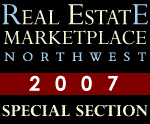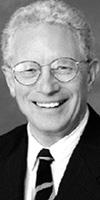
Surveys
DJC.COM
December 7, 2007
CBA Insights speaker profile: Dennis Wilde
For CBA

Firm: Gerding Edlen
Position: Partner
Dennis Wilde is a partner in Gerding Edlen, a real estate development company headquartered in Portland. From his graduate studies in architecture and urban planning to his current role at Gerding Edlen, environmental responsibility and smart design are central to his philosophy. As Gerding Edlen’s designated “green guy,” Wilde has encouraged increased sustainability in development projects while building a strong business case for the economic and social benefits of environmental responsibility. He has more than 20 years of experience in urban planning and design and has been active in construction and real estate development since 1967. He earned a bachelor’s degree in architectural engineering from Washington State University, as well as master’s degrees in architecture and urban planning from the University of Pennsylvania. Wilde is an avid bicycle enthusiast, loves to fly fish and travel. He is an eternal optimist who believes we can change our ways and improve both our economy and way of life without putting on a hair shirt and moving into a cave.

Give us a brief background on Dennis Wilde and Gerding Edlen.
Twelve years ago I was working for Baugh Construction, in the Oregon office. We were meeting with the newly formed Portland-based Gerding Edlen and I felt a kinship with the firm in terms of ethics and their approach to business. I ended up going to work with them.
The company was founded on a core belief that whatever we did had to make a positive contribution to the community where we were active. Our buildings had to make a lasting contribution. It’s a short step from there to being environmentally responsible. We opened an office in Bellevue a year ago and Los Angeles two and half years ago. It’s been an exciting run.
| Getting personal with Dennis Wilde |
|
Q: How are you, personally, reducing your carbon footprint? A: I live close in to the city center. I have sold one car and the other is a hybrid. It usually stays in the garage. I ride the streetcar or bike to work nearly every day. My wife and I purchase carbon credits to offset all of our personal travel and household impact. Q: What’s one thing that the person reading this can do today to contribute to ecological balance? A: Learn what your impact is and then work to reduce it. It is easy to go on line (carbonfootprint.com/USA/calculator.html) and determine your footprint. Q: What’s on your leisure reading list? Business? A: “Break Through: From the Death of Environmentalism to the Politics of Possibility” by Ted Nordhaus and Michael Shellenberger. “Blessed Unrest” by Paul Hawken. Q: If you had to choose your next career today, what would it be? A: Doing exactly what I am doing now. There has never been a better or more demanding time for change in the way we build and operate our built environment. Q: Tell us one thing about yourself that would surprise people. A: I am a minister (mostly performing weddings, etc. — no congregation). |
The attention on sustainability is universal and the amount of information can be overwhelming. What’s your take?
What turned out to be a slow crawl years ago has turned into a high-speed chase. I think it’s great. I got the fire in my belly in grad school in the late 1960s. Now, whether it’s from the price of gasoline going up and up, Al Gore’s documentary and/or the amount of media attention, there’s a growing sense of urgency. People are realizing there’s a dilemma here.
If we are going to save the planet, we need to educate ourselves about the impact of our actions. Only about 3 percent of Americans know where their electrical energy comes from — people don’t make the connection between turning on a light switch and greenhouse gas emissions. Most people don’t realize that 78 percent of all greenhouse gas emissions are from coal-fired power plants.
Education is key, for all of us.
The Pacific Northwest, if not the entire West, seems to be ahead of the pack on environmental issues. Why us?
Sometimes I say, facetiously, it’s in the water. But there’s a certain truth in that. People self-select to live in the Northwest. It’s a lifestyle choice and that choice brings with it a willingness to question the status quo. Is there a better way to protect this precious environment that we live in and love so much?
The act of making the decision to live and stay here and appreciate the natural environment results in a greater awareness of what it takes to preserve it. It runs up and down the Pacific Northwest — British Columbia, Washington, Oregon.
Gerding Edlen transformed five blocks of a nearly obsolete brewery in downtown Portland into a sustainable, urban mixed-use oasis called the Brewery Blocks. What were the lessons there?
What we realized in creating the Brewery Blocks is the most important contribution that we make is not in the buildings that we build but in creating a sense of place, what we call the “principle of place.” A live-work-play place where people engage in social interaction and receive most of the services they need in their day-to-day lives.
We sensed that people hunger for close proximity of services and the rich social interaction that creates. We made conscious decisions on the percentage of retail, office and residential, but we didn’t realize the power of simply putting benches on the corner, creating gathering spaces for people.
We integrate the concept of neighborhoods into an urban, dynamic setting. Observing how that functions, we realize that building single buildings isn’t the answer. You have to look at the community fabric that a development is going into and ask: “How does it relate to the level of pedestrian activity? Are you adding to it or subtracting from it?”
What happens with existing buildings that are not up to current environmental standards?
Gerding Edlen is a reasonably large, regional developer with about $2.6 billion in ongoing work right now. But we can build new, sustainable construction until the cows come home and it’s barely going to make a dent. Existing inventory has to be brought up to appropriate functionality. Most old buildings are terrible performers in terms of energy consumption.
There are huge opportunities to retrofit and upgrade the existing inventory of buildings. That’s where the game is — it’s a lot cheaper than building from scratch.
Other Stories:
- Commercial real estate continues its strength
- Retail evolves in mixed-use projects
- Use cost segregation to cut Uncle Sam’s bite
- Too many condos in Seattle? Think again
- An urban village emerges on Seattle’s First Hill
- Pros and cons of the Industrial Jobs Initiative
- What’s next for Seattle’s CBD office market?
- Developing retail? Here are some things to know
- Downtown becomes too pricey for disabled homeless
- Workforce housing shortage is a ‘silent epidemic’
- Now is the time for apartments — but beware!
- Will good times continue for our market?
- Full speed ahead as CBA turns 30
- CBA Insights speaker profile: John Parker
- CBA Insights speaker profile: Linda Berman
- Hot Eastside office market won’t get red hot
Copyright ©2009 Seattle Daily Journal and DJC.COM.
Comments? Questions? Contact us.